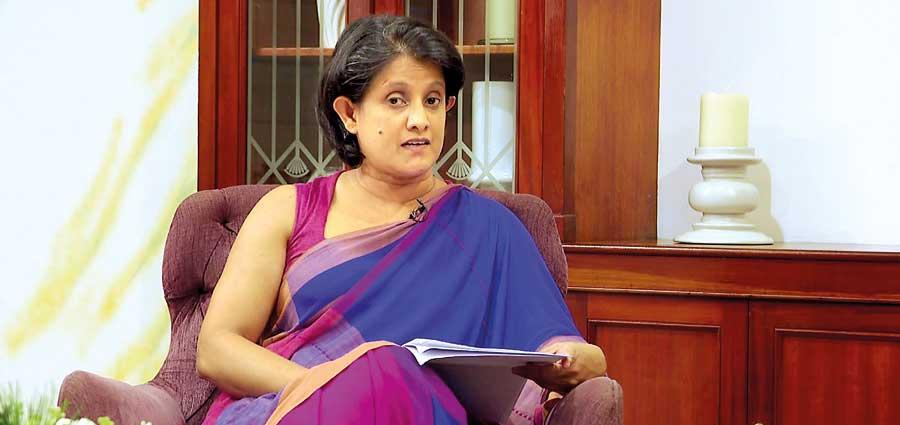Reply To:
Name - Reply Comment
Last Updated : 2024-05-06 10:46:00

Subhashini Abeysinghe
The Sri Lankan Understanding, is geared towards exploring the path taken by Sri Lanka, an island nation in the Indian Ocean, which has experienced a vivid past and possesses the potential for a vibrant future. Bringing together academics, historians, diplomats, writers and key personalities, The Sri Lankan Understanding is aimed at filling a lacuna in society wherein comprehending that which has been, grasping realities, and understanding the opportunities ahead is sorely lacking.
Indian Ocean, which has experienced a vivid past and possesses the potential for a vibrant future. Bringing together academics, historians, diplomats, writers and key personalities, The Sri Lankan Understanding is aimed at filling a lacuna in society wherein comprehending that which has been, grasping realities, and understanding the opportunities ahead is sorely lacking.
The third episode on ‘Sri Lanka’s Exports: Being in sync with global and local developments’ featured Subhashini Abeysinghe, an economist who specializes in international trade and is currently the Director of Research at Verité Research.
Her research focus has been on the Sri Lankan economy, private sector development, economic and trade policy, trade regulations, non-tariff barriers, trade facilitation, WTO and regional trade agreements. Possessing Bachelor’s and Master’s Degrees in Economics from the University of Colombo, and a Master’s in International Law and Economics from World Trade Institute, University of Bern, Switzerland, she has also worked at the Ceylon Chamber of Commerce, the World Bank, Asian Development Bank, USAID, and GIZ.
Covering a gamut of areas on the Sri Lankan economy Ms Abeysinghe highlighted the journey of the economy and how it has changed since independence.
"She noted that at present the economy was less integrated with the global economy than in the 1950s. By using two indicators, the world market share of the country and the exports to GDP ratio, she stressed that the former was at 0.06% and had declined over the years, while the ratio is 1959 was 28% and was 14% today. Over the years the economy became less integrated with the world economy whilst the rest of Asia was far more integrated and was surging ahead"
She noted that at present the economy was less integrated with the global economy than in the 1950s. By using two indicators, the world market share of the country and the exports to GDP ratio, she stressed that the former was at 0.06% and had declined over the years, while the ratio is 1959 was 28% and was 14% today. Over the years the economy became less integrated with the world economy whilst the rest of Asia was far more integrated and was surging ahead.
She emphasized that if we wanted to feel good, we could compare ourselves with countries that do worse than us, but if we wanted to do better we should compare ourselves with countries that have done better than us and learn from them. She also stressed that Sri Lanka needed to compare itself with East Asia because these countries had done very well with international trade becoming a major factor that drove economic growth. Ms Abeysinghe commented on countries across South East and East Asia and explained that they had gone from low income to high-income countries through concerted policies in a short time frame.
"Strategizing the way forward, Ms Abeysinghe was of the opinion that if Sri Lanka wants to develop the export sector we need to be very globally oriented and really understand the big changes in the world and how we can effectively respond through flexible systems and processes"
Reflecting on 2011, she pointed out that Sri Lanka crossed the US$ 10 billion mark and a target was set to become a US$ 20 billion export economy market in 2020, but by 2019 the country had only gone to US$11.5 billion.
Explaining that analysts felt that the 20 billion target was modest at the time, she opined that doubling exports in a decade was not much considering other countries in the region. Bangladesh went from US$ 12 billion to US$ 24 billion in five years and Vietnam went from US$ 50 billion to US$100 billion in just four years. Hence the growth was indeed possible and was not an overly optimistic target but Sri Lanka was not able to achieve it.
Identifying factors that were causing challenges, Ms Abeysinghe pointed out that many raise the lack of diversification and that Sri Lanka is only in a few markets, but said that she disagreed with this general notion, stating that diversification is not the problem but a symptom as the export basket is out of sync with global demand and developments. Raising concern that more than having a small basket, we are probably in the wrong basket, she also discussed value addition and the enhancement process, wherein two-thirds of global trade is in intermediate products, which are parts and components and not the final products. While East Asian nations were fast to respond to this change they have become important stakeholders in this process.
Looking at the period from independence to the 1970s, Ms Abeysinghe observed that Sri Lanka’s exports were based on agriculture and only 20% on industrial or manufactured products.
"Reflecting on 2011, she pointed out that Sri Lanka crossed the US$ 10 billion mark and a target was set to become a US$ 20 billion export economy market in 2020, but by 2019 the country had only gone to US$11.5 billion"
Thereafter with a transition in the late 1970s, the country reversed this ratio wherein 70% of our exports are in manufactured products and approximately 20% is in agriculture. However that export basket is heavily concentrated in one product and that has been so for the last three decades with further challenges encountered owing to reduced competitiveness, especially in the apparel and tea sectors.
Strategizing the way forward, Ms Abeysinghe was of the opinion that if Sri Lanka wants to develop the export sector we need to be very globally oriented and really understand the big changes in the world and how we can effectively respond through flexible systems and processes.
The need for attracting investment in a multiplicity of sectors to develop new products and penetrate new markets was another point that was raised. She stressed that an investment policy and framework were paramount in order to encourage investors into export-oriented sectors. Ms Abeysinghe also pointed out that Covid-19 can be an opportunity as it made changes in lifestyles with the rise of digital technology. Hence digitization and automation were critical for the future, as changes were unlikely to be reversed and would only be further enhanced as we progress forward.
THE SRI LANKAN UNDERSTANDING:
The Sri Lankan Understanding which is geared towards generating interest and intrigue in the multifaceted aspects of the country airs every Wednesday, with repeats on Thursday and Sunday on HiTV and is available on YouTube. The programme is for those keen on gaining a clearer perception of the historic features, and prospective facets of the pearl of the Indian Ocean, as it covers a gamut of issues.

Add comment
Comments will be edited (grammar, spelling and slang) and authorized at the discretion of Daily Mirror online. The website also has the right not to publish selected comments.
Reply To:
Name - Reply Comment
US authorities are currently reviewing the manifest of every cargo aboard MV
On March 26, a couple arriving from Thailand was arrested with 88 live animal
According to villagers from Naula-Moragolla out of 105 families 80 can afford
Is the situation in Sri Lanka so grim that locals harbour hope that they coul
05 May 2024 - 4 - 1224

2 minute ago
05 May 2024